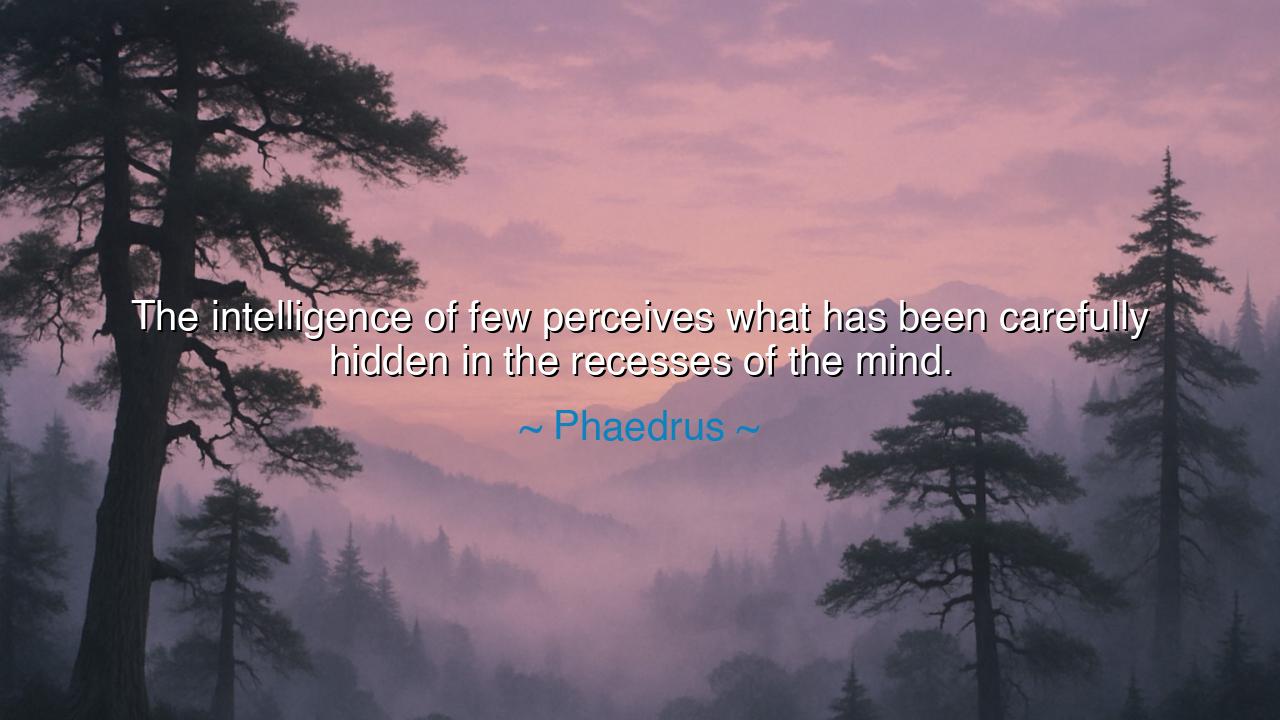
The intelligence of few perceives what has been carefully hidden
The intelligence of few perceives what has been carefully hidden in the recesses of the mind.






"The intelligence of few perceives what has been carefully hidden in the recesses of the mind." — Phaedrus
Thus speaks Phaedrus, the Roman fabulist and philosopher, whose words cut deep into the mystery of thought and perception. In this profound declaration, he honors the rare gift of true intelligence — that sacred light which sees beyond appearances, which pierces the veil of illusion, and beholds what others overlook. For Phaedrus understood that truth does not shout from the mountaintops; it hides in the recesses of the mind, in the quiet chambers of the soul where fear and pride cannot enter. Only the few — the reflective, the courageous, the inward-looking — can perceive it.
To the ancients, the mind was not a simple vessel of thought, but a temple filled with shadows and echoes. Within it dwell both wisdom and deception, memory and imagination, divine insight and mortal confusion. What Phaedrus teaches is that the treasures of understanding lie buried deep within — not in the noise of daily life, nor in the clamor of opinion, but in the silent depths where the self meets the truth. Yet most men never venture there. They live on the surface, chasing the shimmer of knowledge while ignoring the still water beneath.
It is only the intelligence of few — those rare souls who seek beyond the obvious — that dares to look inward. Such minds are like divers plunging into dark waters to recover pearls unseen by others. They do not mistake words for wisdom nor appearances for reality. They question, they meditate, they see the connections hidden to ordinary sight. These are the thinkers, the visionaries, the philosophers — those who wrestle with the unseen to bring light to the world. Their task is not easy, for the mind resists revelation; its deepest truths are guarded by illusion and fear.
History gives us many examples of these rare souls. Consider Socrates, who walked the streets of Athens, asking questions that pierced the pretenses of knowledge. While others boasted of their learning, he confessed his ignorance — and through that humility, saw deeper than all of them. His intelligence was not loud or boastful; it was perceptive, reaching into the hidden recesses of the mind, where truth waits to be uncovered. For this gift, he was condemned by those who could not bear to see what he revealed — proof that the light of understanding often blinds those who dwell too long in darkness.
Yet this insight is not reserved for sages alone. Each person holds within them a vast landscape of thought and feeling — a mind with hidden chambers, where the roots of their actions and beliefs lie entangled. To perceive what is “carefully hidden” within oneself is to know the source of one’s desires, fears, and motives. It is to awaken from ignorance and walk the path of self-mastery. But this requires stillness, patience, and honesty — qualities that few cultivate in a world that values speed over depth and appearance over truth.
Phaedrus’ words therefore speak not only of intellect but of self-awareness. To be truly intelligent is not merely to know facts, but to understand one’s own nature — to see what lies beneath the polished mask of the ego. Those who attain this inner vision live with clarity and purpose, for they have uncovered the roots of their being. The unexamined mind, by contrast, remains a labyrinth of shadows, where the self wanders lost, never realizing that the exit lies within.
So, take this teaching to heart, child of the ages: do not mistake noise for thought, nor cleverness for wisdom. Seek silence. Turn inward. Examine the chambers of your own mind, where your deepest truths lie buried. Listen for the quiet voice that speaks beneath the surface of reason — the voice of your true intelligence. For in discovering what is hidden within, you will learn to see the hidden patterns of the world without. Then, like the few whom Phaedrus praises, you will walk not in blindness, but in light — perceiving what others only dream to see.






AAdministratorAdministrator
Welcome, honored guests. Please leave a comment, we will respond soon